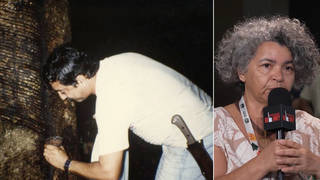The United Nations’ humanitarian chief John Holmes is urging the international community not to turn its back on Somalia at a time of desperate need. Holmes said the U.S.-backed Somali government appears to be seriously underestimating the humanitarian suffering in the country. Holmes testified before the U.N. Security Council on Monday. He said that almost 400,000 Somalis fled Mogadishu following the U.S.-backed Ethiopian invasion and that the vast majority of people have not returned home. Newsweek has reported some refugees have resorted to renting trees for shelter. Meanwhile, aid workers in Somalia have described a dire situation inside the few medical clinics set up.
Mathias Frese, of the International Committee of the Red Cross: “We are doing distribution of food for displaced families from Mogadishu. We are addressing about 800, 900 families in this town. The families, the people fled from Mogadishu recently because of the heavy fighting, and here they are seeking protection by their clan.”
The head of one Somali Red Crescent clinic said many of the refugees are suffering from malnutrition.
Nassra, head of Somali Red Crescent clinic: “There are 25 to 30 people who come every day, mainly displaced people from Mogadishu. Their main problem is watery diarrhea and malnutrition. Our medical stock is decreasing faster than usual, and this affects our supply chain.”










